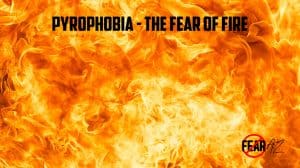Share This Article
Do You Have Too Much Fear of Fire?
There’s nothing more unpredictable than fire. It can be both beautiful and terrifying, both friend or foe. The discovery of fire changed the world and helped in the development of civilizations. But it has also been known to take the opposing side, destroying entire forests and towns.
Some people are fascinated with fire, whereas others steer clear of the mere mention of the word. Where do you fall on this spectrum? Do you tend to avoid flames of any size? Are campfires or even scented candles out of the question. Do birthday candles or the smell of smoke make you jittery? If you’ve answered yes to these questions, you may have a phobia of fire.
Yes, fire can cause damage, harm, or even death, but you know that your case is different. Your thoughts and assumptions are overpowered by your fear. When the phobia triggers, your thinking and behaviors are affected.
You may also have a nagging feeling that fire could break out and envelop you at any time, even if there is no apparent threat.
Talking about your fear of fire and the anxiety it causes you is also difficult. You worry that while other people may readily admit that they are afraid of fire, they could also deem your situation as an exaggeration.
Believe it or not, a good number of the population suffer from a fear of fire. You are not alone! Know that options are available to help reduce, or even overcome, your fear of fire phobia.

What Is the Fear of Fire Called?
The fear of fire is known as pyrophobia. Although everyone fears fire to some extent, for a phobic, the anxiety can be debilitating and interfere with daily life.
Small and controlled fires, such as what you have in a fireplace or even those on candles, can cause you overwhelming anxiety. Some phobia sufferers might find themselves checking their stove constantly or fiddling with smoke detectors’ batteries every day. In such cases, these individuals also run the risk of developing obsessive-compulsive disorders.
What Causes Pyrophobia?
Pyrophobia, unlike many other phobias, may have a clear origin. Adults repeatedly tell children to stay away from and never play with fire. In some cases, this constant reminder could be what might have planted the seed of fear in you as a child. In other cases, a traumatic past event, for instance, having escaped from a burning building or vehicle, could be the reason for your phobia.
Pyrophobia Symptoms
Pyrophobia shares the same symptoms as other phobias. People with pyrophobia may exhibit both physical and psychological symptoms. They may experience one or several symptoms, depending on their fear’s severity level.
Physical Symptoms:
- Dry mouth
- Difficulty in breathing
- Fainting
- Headache
- Increased heart rate
- Loss of breath
- Nausea and dizziness
- Shaking uncontrollably
- Stomach cramps
- Sweating and chills
- Vomiting
Psychological Symptoms:
- Constant thoughts of being hurt by fire
- Feeling of guilt or shame about your fear
- Hesitation to be near candles, campfires, and fireplaces
- Immediate and intense fear
- Restlessness and irritability
- Smelling smoke from nowhere
How to Deal with Pyrophobia
Phobia symptoms, be they physical or psychological, can be exhausting to the sufferer. The feeling of helplessness and being filled with irrational thoughts can also be depressing.
If you’re suffering from this phobia, acknowledging the condition is the first step—and the most important. By doing so, you are allowing yourself to better understand your condition and learn the options available to help you cope.
On the other hand, if your fear of a house fire is already negatively impacting your relationships or daily living activities, seeking help from your medical provider is highly encouraged. Methodologies and treatments to help sufferers effectively cope with and manage their fear are now available. The treatment process is long, but deciding to seek treatment is a huge step forward.
Things You Can Do to Help Yourself
Dealing with pyrophobia by yourself is something that you can initially try before scheduling a professional consultation. This is your internal battle, and you know yourself better than anyone else.
If you choose this route, the first thing to do is to be kind to yourself and be your own best friend and motivator. Always remind yourself that your fear doesn’t make you less of a person.
You can also engage in physical activities: simple exercises, yoga, or learning some breathing techniques. Physical activities can help you refocus your negative energy. Exercise is also your body’s way of telling your brain to relax and calm down.
You can also try to get to know the fire in a positive light. Focus on all the benefits fire has instead of dwelling on its destructive properties.

If you can, try to “sit with your fear” for sixty seconds. You can watch a blazing fire on your phone for a full minute while doing deep breathing and reminding yourself that you are okay. After that full minute, do a nurturing and relaxing activity to help you transition smoothly from the exercise.
Gradually prolong your exposure to your fear until you are ready to come face to face with it in other settings, such as sitting in front of a campfire or fireplace.
Getting Professional Treatment for Pyrophobia
The first step in pyrophobia treatment is to have a psychotherapist diagnose it. In this approach, you will need to share your symptoms and your usual reaction once your fear takes place.
Some of the therapies and techniques that can treat pyrophobia include psychoanalysis and hypnotherapy. With your consent, your medical team can work to establish an understanding of your fear’s root cause.
You can also try exposure therapy or desensitization, in which you will be gradually exposed to the object of your fear. Your therapist may also encourage you to connect with others suffering from pyrophobia by attending support groups.
If your phobia symptoms are extreme, you might be prescribed medication. Note that the prescription does not address the phobia itself, but is focused on treating the physiological symptoms you may exhibit.
Many methodologies can help you control and eventually overcome your fear. But the most important key to treatment is a commitment to overcoming the phobia.
Learning to Cope with Pyrophobia
All the self-help recommendations and even the professional treatment will not completely eliminate the phobia. Still, these approaches will give you the confidence that you can control your reactions well when faced with fire.
As you battle against your fear, support from your family and friends can give you a much-needed morale boost. You can become more determined when you know that the people you love are rooting for you.
In Conclusion
Find inspiration in this quote: “Be fearless in the pursuit of what sets your soul on fire.” In your case, overcoming your fear of fire.
Douse that burning fear with great determination, because while fire should indeed be approached with caution, it is also essential to life.



